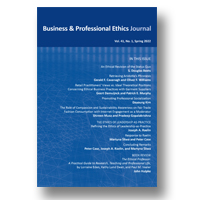|
|
|
1.
|
Business and Professional Ethics Journal:
Volume >
42 >
Issue: 1
Hussam Al Halbusi, Homoud Alhaidan, T. Ramayah, Salem AlAbri
Ethical Leadership and Employees’ Ethical Behavior:
Modeling the Contingent Role of Moral Identity
abstract |
view |
rights & permissions
| cited by
Ethical scandals, as well as unethical behaviour, are becoming major concerns in recent times. Thus, this study focused on the role of ethical climate and employees’ moral identity. Specifically, this study examined the mediation effect of ethical climate on the relationship between ethical leadership and employees’ ethical behaviour. Also, the study investigated the moderating role of employee moral identity on the relationship between ethical climate and employees’ ethical behaviour. Data were collected from 620 full-time employees working at thirty-three Iraqi organisations from five Iraqi provinces. These organisations were from various industry sectors such as manufacturing, retailing, medical, insurance, information technology, legal, finance, and telecommunication sectors. The study found that ethical leadership impacted on the ethical behaviour of employees and the ethical climate also significantly mediated the relationship between ethical leadership and employees’ ethical behaviour. The moderating role of moral identity on the relationship between ethical climate and ethical behaviour was found to be insignificant in this context.
|
|
|
|
|
|
|
2.
|
Business and Professional Ethics Journal:
Volume >
42 >
Issue: 1
Rockwell Clancy, Qin Zhu
Why Should Ethical Behaviors Be the Ultimate Goal of Engineering Ethics Education?
abstract |
view |
rights & permissions
| cited by
Ethics is crucial to engineering, although disagreement exists concerning the form engineering ethics education should take. In part, this results from disagreements about the goal of this education, which inhibit the development of and progress in cohesive research agendas and practices. In this regard, engineering ethics faces challenges like other professional ethics. To address these issues, this paper argues that the ultimate goal of engineering ethics education should be more long-term ethical behaviors, but that engineering ethics must more fully engage with the fields of empirical moral and cultural psychology to do so. It begins by considering reasons for adopting ethical behaviors as the ultimate goal of ethics education, and moves on to discuss why ethical behaviors have not been adopted as the goal of ethics education. The paper ends by considering responses to these problems, why ethical behaviors should still be adopted as the ultimate goal of ethics education.
|
|
|
|
|
|
|
3.
|
Business and Professional Ethics Journal:
Volume >
42 >
Issue: 1
Thomas A. Hemphill
A Case for Effective Business Association Membership Codes of Ethics and Conduct
abstract |
view |
rights & permissions
| cited by
A business association is a collaborative organization founded and funded by businesses or business owners and usually represents companies operating in an industry or across industries. Business associations often institute a code of ethics, code of practice, and/or code of conduct that guide member company policy and behavior. Specifically, the paper will thoroughly define codes of ethics, conduct, and practice; their relationship to each other is delineated and explained; examples of three business associations’ codes of ethics and/or conduct are explored; and the U.S. legal environment—focusing on antitrust considerations that governs their organizational use—evaluated for business association compliance enforcement. Given this exploratory and explanatory research foundation, managerial recommendations are offered in the discussion section to assist business associations, and by extension, their member companies, in effectively utilizing such association governance codes in both association and company planning, policy development, and operational management activities in domestic and global commerce.
|
|
|
|
|
|
|
4.
|
Business and Professional Ethics Journal:
Volume >
42 >
Issue: 1
Matthew Sinnicks
In Defence of Wish Lists:
Business Ethics, Professional Ethics, and Ordinary Morality
abstract |
view |
rights & permissions
| cited by
Business ethics is often understood as a variety of professional ethics, and thus distinct from ordinary morality in an important way. This article seeks to challenge two ways of defending this claim: first, from the nature of business practice, and second, from the contribution of business. The former argument fails because it undermines our ability to rule out a professional-ethics approach to a number of disreputable practices. The latter argument fails because the contribution of business is extrinsic to business in a way that distinguishes from the established professions. The article ultimately suggests we adopt a more aspirational approach to business ethics, which retains an appeal even in the face of charges of anti-capitalist irrelevance.
|
|
|
|
|
|
|
5.
|
Business and Professional Ethics Journal:
Volume >
42 >
Issue: 1
Tamas Sneider
How Organizations Lose Their Way:
Unethical Behavior and Moral Disengagement in Complex Organizational Context
abstract |
view |
rights & permissions
| cited by
Unethical behavior in organizations has garnered more and more attention in the last decades but most of the scholarly work has used a static approach relying on methodological individualism and a mechanistic worldview when studying this topic. The process of moral disengagement and organizational culture have been linked to the prevalence of unethical behavior earlier, but this paper uses a complexity-informed systems perspective to explore the dynamic relationship of these concepts and aims to improve our understanding of the often unnoticeable, step-by-step process through which organizational cultures can become conducive to unethical behavior. Organizations are conceptualized as complex adaptive systems in which transformative and stabilizing processes based on feedback loops take place continuously. It is discussed how these processes can lead to a phase transition driving organizations towards a state where unethical behavior is the general norm. The process is illustrated through real-life examples.
|
|
|
|
|
|
|
6.
|
Business and Professional Ethics Journal:
Volume >
42 >
Issue: 1
Notes on Contributors
view |
rights & permissions
| cited by
|
|
|
|





